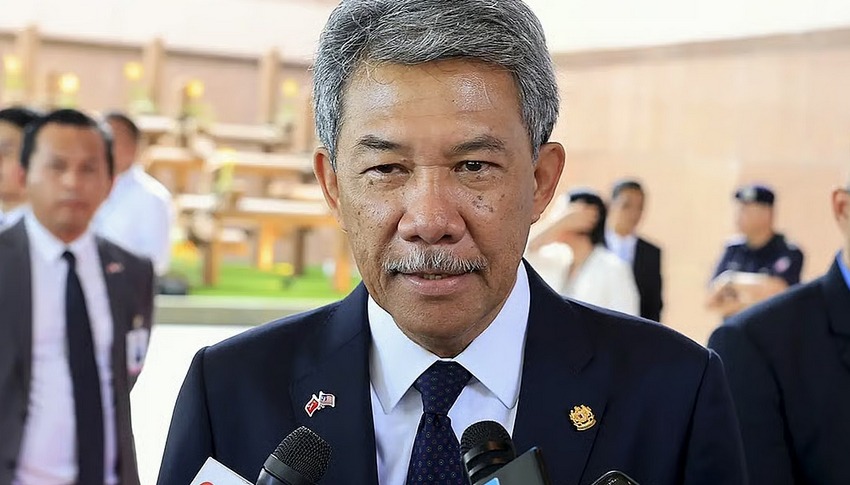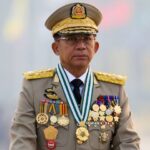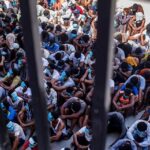
Malaysia Postpones ASEAN Delegation Visit to Myanmar
KUALA LUMPUR – A much-anticipated visit to Myanmar led by Malaysia’s Foreign Minister, Mohamad Hasan, has been postponed, according to an official statement released by Wisma Putra, Malaysia’s foreign ministry. The visit, which was originally scheduled to take place today, was deferred due to what the ministry described as “unavoidable circumstances.” No further explanation was provided, but officials said a revised date will be announced later.
A Planned ASEAN Mission Put on Hold
The trip was intended to be a significant diplomatic mission under Malaysia’s role as ASEAN chair for 2025. Mohamad Hasan was set to lead a delegation that included his counterparts from Thailand, the Philippines, and Indonesia. The main purpose of the visit was to evaluate the political and security situation in Myanmar following the dissolution of the military junta government and the lifting of the state of emergency.
For ASEAN, this mission was expected to provide firsthand insight into how Myanmar is managing its transition and whether conditions are suitable for the general election that the authorities have promised to hold in late 2025. However, with more than 60 towns still under emergency rule and fighting continuing in several regions, questions remain about the feasibility and legitimacy of such an election.
From Coup to Fragile Transition
Myanmar’s political turmoil began in February 2021 when the military seized power from the elected government of Aung San Suu Kyi’s National League for Democracy (NLD). The coup sparked nationwide protests, civil disobedience, and a growing armed resistance movement. Over the following four years, Myanmar experienced severe political repression, economic collapse, and widespread human rights abuses.
On July 31, 2025, the State Administration Council—the ruling body of the junta—announced that the nationwide state of emergency, which had been extended several times since 2021, was finally lifted. Officials portrayed the move as a necessary step toward holding elections. Yet many analysts and rights groups dismissed the announcement as largely symbolic, pointing out that opposition leaders remain imprisoned, fighting continues across the country, and entire communities are still living under military-imposed restrictions.
Mohamad Hasan’s Concerns
In the weeks leading up to the planned visit, Foreign Minister Mohamad Hasan stressed that ASEAN needed a clearer understanding of Myanmar’s path forward. He openly questioned how the country could organize a general election when dozens of towns remained under emergency rule and much of the population continues to face insecurity.
As Malaysia holds the ASEAN chairmanship this year, Mohamad emphasized that ASEAN must play a more active role in addressing Myanmar’s crisis. He has repeatedly underlined that ASEAN’s credibility depends on whether it can engage meaningfully with the situation, rather than issuing statements without follow-up. His visit, therefore, was seen as both symbolic and practical: a chance to demonstrate leadership while directly assessing Myanmar’s political reality.
ASEAN’s Difficult Role
Since the 2021 coup, ASEAN has struggled to respond to Myanmar in a unified manner. In April of that year, the bloc agreed on a “Five-Point Consensus” which called for an end to violence, dialogue among all parties, and humanitarian access. Yet implementation has been weak, with the junta showing little willingness to cooperate.
ASEAN has taken some steps to apply pressure, including barring Myanmar’s military leaders from attending high-level summits. Special envoys have also been appointed to mediate. However, deep divisions within ASEAN have limited progress. Some member states have favored a tougher stance, while others prefer quiet diplomacy and non-interference.
The postponed delegation led by Mohamad Hasan was intended to break the impasse by sending multiple foreign ministers to see the situation firsthand. The delay, however, risks reinforcing perceptions that ASEAN lacks the unity and resolve needed to address one of the region’s most pressing crises.
Possible Reasons for the Delay
While Wisma Putra has not clarified why the trip was postponed, observers point to several possible reasons. Security remains a significant concern, with ongoing clashes in multiple regions posing risks to visiting delegations. Logistical or political challenges inside Myanmar’s interim administration may also have complicated arrangements.
Analysts stress that delays are not uncommon in delicate diplomatic missions, but they warn that timing is critical. “ASEAN cannot afford indefinite postponements,” said one analyst based in Kuala Lumpur. “The credibility of ASEAN as well as the future of Myanmar’s people depend on clear and decisive engagement.”
Myanmar’s Election Roadmap Under Scrutiny
The central issue at the heart of ASEAN’s involvement is whether Myanmar can deliver on its promise of elections in 2025. Although lifting the state of emergency was framed as progress, the reality on the ground remains deeply problematic.
Key opposition leaders, including Aung San Suu Kyi, are still detained and barred from participating in politics. Large swaths of the country are effectively controlled by ethnic armed groups or resistance movements, making nationwide polling logistically impossible. International organizations such as the United Nations have warned that elections under such conditions risk being little more than a façade designed to entrench military influence.
For many inside Myanmar, the promise of elections offers little hope unless it is accompanied by genuine reforms, political inclusivity, and dialogue with all stakeholders. Without such steps, the election could inflame tensions rather than resolve them.
Regional Implications
The instability in Myanmar carries broader consequences for ASEAN and the region as a whole. Ongoing conflict has led to refugee flows into neighboring countries, increased cross-border crime, and humanitarian crises that extend beyond Myanmar’s borders.
If Myanmar fails to stabilize, ASEAN’s collective security and economic aspirations may be undermined. As the chair, Malaysia is under pressure to show leadership. The planned visit by Mohamad Hasan was intended to signal a more proactive ASEAN role. Its postponement, however, underscores the difficulty of finding common ground and delivering results.
Looking Ahead
At present, no new date has been set for the ASEAN delegation’s visit to Myanmar. Wisma Putra has stated that further details will be shared once circumstances permit. Until then, the uncertainty continues.
The months ahead will be critical for Myanmar’s future. Whether the government can deliver credible elections will determine not only its internal stability but also ASEAN’s reputation as a regional body capable of managing crises. If the bloc cannot find a meaningful way forward, it risks being sidelined in global efforts to address Myanmar’s ongoing turmoil.
Conclusion
The postponement of Mohamad Hasan’s visit highlights the fragile and uncertain nature of Myanmar’s political transition. While lifting the state of emergency was presented as a step toward normalization, the reality remains one of deep instability and mistrust. For ASEAN, the challenge is not simply to observe events but to act in a way that supports genuine progress.
Whether the upcoming months bring clarity or deeper division will depend on how Myanmar’s authorities proceed with their electoral plans and whether ASEAN can rise to the occasion. For now, both the people of Myanmar and the international community remain in a state of cautious anticipation, awaiting signs of genuine reform and a path toward peace.
Related posts:
 ASEAN Rejects Myanmar’s Military Elections, Illegitimate
ASEAN Rejects Myanmar’s Military Elections, Illegitimate
 Myanmar Junta signs $3m lobbying deal to rebuild U.S. ties
Myanmar Junta signs $3m lobbying deal to rebuild U.S. ties
 Inle Lake Buddhist Festival in Myanmar | Tradition & Renewal
Inle Lake Buddhist Festival in Myanmar | Tradition & Renewal
 Myanmar Military Paraglider Strike Kills Dozens
Myanmar Military Paraglider Strike Kills Dozens
 Thailand Extradites Shwe Kokko Tycoon She Zhijiang to China
Thailand Extradites Shwe Kokko Tycoon She Zhijiang to China
 𝗛𝗼𝘄 𝗠𝘆𝗮𝗻𝗺𝗮𝗿’𝘀 𝗖𝘆𝗯𝗲𝗿-𝗦𝗹𝗮𝘃𝗲𝗿𝘆 𝗡𝗲𝘁𝘄𝗼𝗿𝗸𝘀 𝗘𝘅𝗽𝗹𝗼𝗶𝘁 𝗬𝗼𝘂𝗻𝗴 𝗔𝗳𝗿𝗶𝗰𝗮𝗻𝘀 𝗔 𝗡𝗲𝘄 𝗣𝗵𝗮𝘀𝗲 𝗼𝗳 𝗮𝗻 𝗘𝘅𝗽𝗮𝗻𝗱𝗶𝗻𝗴 𝗖𝗿𝗶𝘀𝗶𝘀
𝗛𝗼𝘄 𝗠𝘆𝗮𝗻𝗺𝗮𝗿’𝘀 𝗖𝘆𝗯𝗲𝗿-𝗦𝗹𝗮𝘃𝗲𝗿𝘆 𝗡𝗲𝘁𝘄𝗼𝗿𝗸𝘀 𝗘𝘅𝗽𝗹𝗼𝗶𝘁 𝗬𝗼𝘂𝗻𝗴 𝗔𝗳𝗿𝗶𝗰𝗮𝗻𝘀 𝗔 𝗡𝗲𝘄 𝗣𝗵𝗮𝘀𝗲 𝗼𝗳 𝗮𝗻 𝗘𝘅𝗽𝗮𝗻𝗱𝗶𝗻𝗴 𝗖𝗿𝗶𝘀𝗶𝘀
